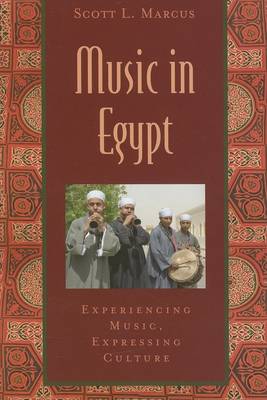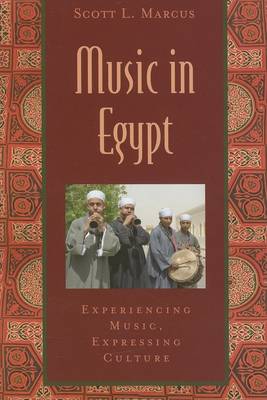
- Retrait gratuit dans votre magasin Club
- 7.000.000 titres dans notre catalogue
- Payer en toute sécurité
- Toujours un magasin près de chez vous
- Retrait gratuit dans votre magasin Club
- 7.000.000 titres dans notre catalogue
- Payer en toute sécurité
- Toujours un magasin près de chez vous
Description
Music in Egypt is one of several case-study volumes that can be used along with Thinking Musically, the core book in the Global Music Series. Thinking Musically incorporates music from many diverse cultures and establishes the framework for exploring the practice of music around the world. It sets the stage for an array of case-study volumes, each of which focuses on a single area of the world. Each case study uses the contemporary musical situation as a point of departure, covering historical information and traditions as they relate to the present. Visit www.oup.com/us/globalmusic for a list of case studies in the Global Music Series. The website also includes instructional materials to accompany each study.
Music in Egypt provides an overview of the country's rich and dynamic contemporary musical landscape. It offers an in-depth look at specific Egyptian musical traditions, paying special attention to performers and the variety of contexts in which performances occur. The book acknowledges the pervasive presence of Islam by focusing on two Muslim performance genres and by considering the age-old issue of the compatibility of music and Islam. It accomplishes the latter by incorporating the voices of many of the performers featured on the accompanying CD. The volume features a variety of musics that reflect and help to create a number of distinct regional, national, and community identities co-existing in Egypt today.
Drawing on more than twenty years of extensive fieldwork, Scott L. Marcus offers detailed ethnographic documentation of seven performance traditions found in Egypt today: the call to prayer; madh, a genre of Sufi religious music; southern Egyptian mizmar folk music; early twentieth-century takht-based art music; music by the acclaimed singer Umm Kulthum, which dominated the mid-twentieth century; wedding procession music; and music by the current superstar pop singer Hakim. The book is packaged with an 80-minute audio CD containing excellent examples of each tradition. All of the examples are based in a single melodic mode--maqam rast--to best engage students with the musical form, structure, and practice of the traditions. Separate educational tracks on the CD introduce maqam rast and the variety of rhythms found in the CD examples. In addition, the CD features a special solo improvisation (taqasim) in maqam rast by UCLA professor Ali Jihad Racy, to help students better understand this particular melodic mode.
Enhanced by eyewitness accounts of performances, interviews with performers, listening examples, and song lyrics that enable students to interact with the text, Music in Egypt provides a unique and hands-on introduction to the country's diverse and captivating music.
Music in Egypt provides an overview of the country's rich and dynamic contemporary musical landscape. It offers an in-depth look at specific Egyptian musical traditions, paying special attention to performers and the variety of contexts in which performances occur. The book acknowledges the pervasive presence of Islam by focusing on two Muslim performance genres and by considering the age-old issue of the compatibility of music and Islam. It accomplishes the latter by incorporating the voices of many of the performers featured on the accompanying CD. The volume features a variety of musics that reflect and help to create a number of distinct regional, national, and community identities co-existing in Egypt today.
Drawing on more than twenty years of extensive fieldwork, Scott L. Marcus offers detailed ethnographic documentation of seven performance traditions found in Egypt today: the call to prayer; madh, a genre of Sufi religious music; southern Egyptian mizmar folk music; early twentieth-century takht-based art music; music by the acclaimed singer Umm Kulthum, which dominated the mid-twentieth century; wedding procession music; and music by the current superstar pop singer Hakim. The book is packaged with an 80-minute audio CD containing excellent examples of each tradition. All of the examples are based in a single melodic mode--maqam rast--to best engage students with the musical form, structure, and practice of the traditions. Separate educational tracks on the CD introduce maqam rast and the variety of rhythms found in the CD examples. In addition, the CD features a special solo improvisation (taqasim) in maqam rast by UCLA professor Ali Jihad Racy, to help students better understand this particular melodic mode.
Enhanced by eyewitness accounts of performances, interviews with performers, listening examples, and song lyrics that enable students to interact with the text, Music in Egypt provides a unique and hands-on introduction to the country's diverse and captivating music.
Spécifications
Parties prenantes
- Auteur(s) :
- Editeur:
Contenu
- Nombre de pages :
- 224
- Langue:
- Anglais
- Collection :
Caractéristiques
- EAN:
- 9780195146455
- Date de parution :
- 17-11-06
- Format:
- Livre
- Dimensions :
- 140 mm x 209 mm
- Poids :
- 281 g







